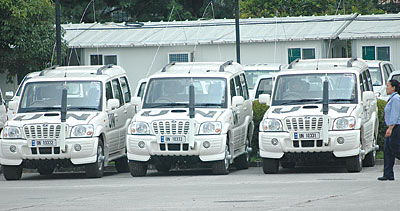 KIRAN PANDAY |
After weeks of speculation, the government sent a 'constructively ambiguous' letter to the UN requesting an extension of UNMIN's mandate. After a long prelude, it asked for a mandate that focused on monitoring of Maoist combatants and arms without specifically asking that the Nepal Army (NA) be taken off UNMIN monitoring.
Three and a half years after the interim legislature was constituted and two years after the special committee was formed, the government has discovered these developments mean there are no longer 'two sides' to the conflict, and that the government's voice is the only legitimate voice. Why were they going through the charade of consulting the Maoists on UNMIN extension all this time? Or, why did the Maoist government have to consult the NC on the issue? And why did they not revise agreements to reflect this reality, and change the mandate request accordingly, earlier?
The letter also tells the UN that the situation has 'evolved rapidly' and many of UNMIN's tasks are 'redundant'. One wonders what progress Baluwatar and its allies have seen in the peace process since the last extension in May, for the rest of the country can only see stagnation.
But the letter's details, and the legalistic claims and counter claims on both sides, are not really the core of the issue. Neither is UNMIN's functioning. It is the politics behind the extension.
The change in the balance of power since the agreements were signed originally, and the differing motivations of the actors who signed those pacts, explains why UNMIN manages to invite ire at such regular intervals despite its fairly marginal role in day-to-day politics.
Think back to the end of 2006. The CPA was greeted with euphoria. The Seven Party Alliance and the Maoists saw themselves as partners against the monarch. The NA was still treated with deep suspicion, to the extent that GP Koirala gave the Maoists the green signal to inflate the numbers of the PLA in cantonments to 'balance the army'. Prachanda obliged way beyond Koirala's imaginings, and sent his core fighters to the YCL, but that is another matter.
Koirala decided that the best way to bring the Maoists 'into the mainstream' was by creating a new framework and new institutions that could accommodate them. The interim constitution, interim legislature, and interim government were constituted. The republican agenda was accepted. And UNMIN was invited, to give a sense of security to the Maoists, who wanted international legitimacy, and to fulfill the tasks of arms monitoring that no other external force could.
Few people in the NC and UML really believed in the new framework. But they privately knew Maoist strength had played a key role in bringing them back to power through the People's Movement. They also hoped this would 'lock' the Maoists in and co-opt them, and eventually through elections the hegemony of 'democratic forces' could be restored.
Think about all that has changed since then. The king has gone and there is no common 'enemy'. After the elections, but particularly since the Katawal incident last year, NC and UML started seeing the NA as a partner in their battle against the Maoists. This is a historic and unprecedented shift in Nepali politics; the NC and NA are on the same side.
There is almost a consensus in the 'democratic camp' that Koirala gave 'too much' to the Maoists, who are seen to have gone back on their promises. The logic of the anti-Maoist Madhav Nepal coalition was that it is not by giving the Maoists space, but by isolating them entirely, that they will be 'weakened' and forced to 'reform'. So keeping them out of power, and getting all domestic and international actors to pressure the Maoists, became a primary goal.
But there is a problem. Two institutions serve as a constant reminder to the spirit of those heady 2006 days �" the CA and UNMIN. Until the CA is around, the Maoists cannot be sidelined. The prospect of them coming to power remains, and their agenda cannot be brushed aside. Until UNMIN is present, there is a symbolic acceptance of 'two armies' since that was the basis of the Agreement on Monitoring the Management of Arms and Armies. And there remains international recognition of the Maoists as a genuine 50 per cent stakeholder in the peace process.
If understood in the context of this anti-Maoist strategy, the attack on UNMIN makes perfect sense. But it is a reminder of how far we have moved from the days of the 2006 political framework, the new balance of power, and how implementing the peace accords has become infinitely more difficult now.
READ ALSO:
How do we get out of this hole?, PUBLISHER'S NOTE
Special Security Plan falters, SITA MADEMBA



